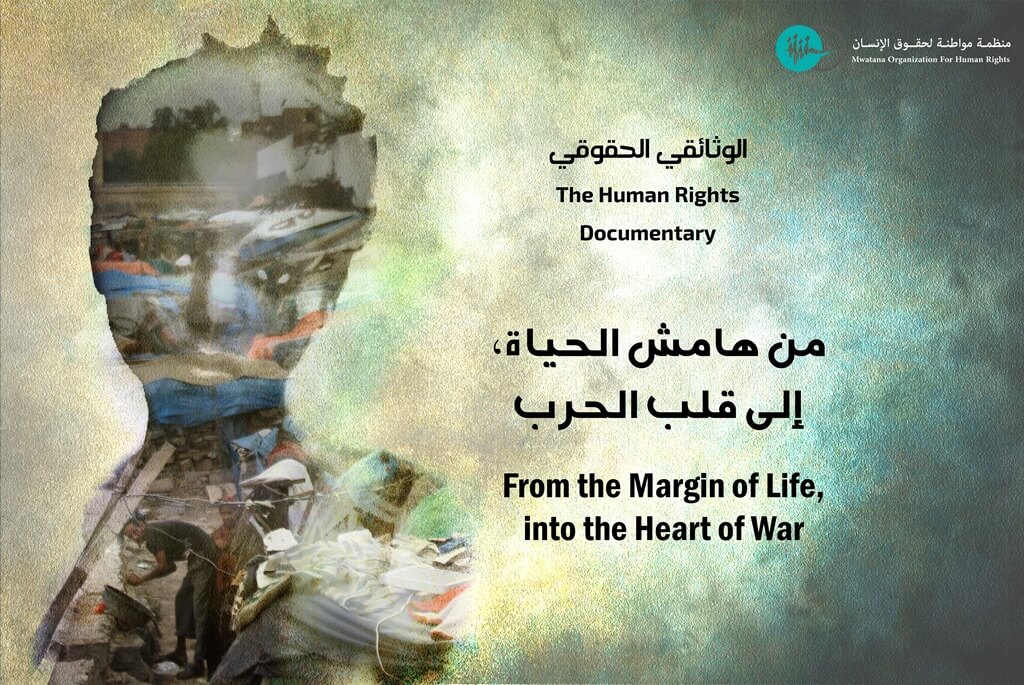
a documentary by Mwatana Organization for Human Rights about the suffering of people from the marginalized group in Yemen who find themselves in the heart of the war

On the two sides of a bridge in the area of Al-Dalil in Ibb governorate, a series of scattered huts covered with nylon housing dozens of families with brunet skin who are known in Yemen as the marginalized people. The scene of the poor huts don’t only reflect the misery and privation this group has been suffering from but also it does narrate another story tinted with blood in which their misery in peace combined with their catastrophe in war. On the two sides of the bridge, 22 of those marginalized people were killed including two children, and 32 more were injured in an airstrike by the Saudi-led Arab Coalition on 26 April 2015.
Under the debris of eight houses in the Workers’ City situated in the area of Sawan eastern the capital Sana’a, 23 of marginalized people were killed when the Arab Coalition warplane bombarded the eight houses in the city which assigned 15 years ago by the government with international finance for the marginalized people as a residential area. The victims included 14 children and seven women of one single family.
The attack on 12 July 2015 resulted in wounding 28 of the marginalized people including 17 children and seven women. Eyewitnesses living in the area located in Sho’op District disclaimed that the militants of Ansar Allah armed group (Houthis) entrenched in the zone prior the attack.
Majid Al-Jamel, Deputy Chairman of the Executive Bureau of the National Union of the Marginalized People said in a testimony to Mwatana Organization: “Headquarters of the Military Engineering Directorate where the Houthi group fighters were positioning located, three kilometers away eastern the workers zone, and the Mountain of Nukom which contained weapons depots and Houthis’ military positions are 10 kilometers away from the site of the airstrike”.
The big paradox is that the marginalized people have to pay a high portion of the wars’ bill the country plunged in since the Houthi armed group has taken over power in the winter of 2014, and the announcement of the Saudi-led Arab Coalition late March 2015, to launch war against Houthi armed group and forces loyal to former President Ali Abdullah Saleh under the pretext of re-instating the legitimate transitional President Abd Rabo Mansour Hadi. While the marginalized people have been deprived of all their citizenship-related rights during the peace and constantly remained on the margin of life, during the war, they have jumped into the heart of the scene but as victims.
The marginalized people are the poorest segment of all population in the country. It is hardly to find one of them holding a job outside the cleaning works that all other social groups reject. The worst is that the marginalized people are governed by unwritten social isolation rules that are strictly applied by the society; the governmental policies contribute to such social segregation. As a result, the marginalized people have been crowded in isolated camps lacking lowest basic public services in the edges of cities or in isolated closed communities in remote rural areas.
Before dozens of marginalized killed in Ibb and Sana’a, 10 of marginalized civilian people were killed in the governorate of Taiz including seven children their ages between three and ten years when the coalition jet fighters fired a missile struck their community located in the village of Akamat al-Kharabah in the area of Al-Dhohrah, Mawyiah district. The attack which occurred on 14 April 2015 resulted also in wounding 14 more civilians.
Eyewitnesses whom interviewed by Mwatana Organization estimated the distance at one kilometers between the marginalized community hit by the deadly airstrike and a military site associate to the 22 Mechanic Military Brigade located in the area; the brigade is one of the Republican Guards brigades which are loyal to the former President Ali Saleh and fighting against Hadi’s forces.
This attack will leave an eternal sorrow in the heart of Hassan Saeed Al-Hojiri, a marginalized man in his 50s who lost six of his children and one nephew in one of the war’s catastrophic incidents at one single house.
The deadly air strike killed six of Al-Hojiri’s sons and daughters: Mukhtar (10 years), Radhiah (8 years), Morad (6 years), Mohammed (5 years), Mariam 3 years) and Abdullah (one year old), besides his nephew Bakr Emad (7 years).
Rabie` Mohammed Al-Hadadi (24 years) one of the local residents whom Mwatana Organization interviewed reported that the marginalized families had fled the camp which came under attack; the residents in the area don’t know where did the grieved family go.
Wadhah Mohammed Abdo (22 years) told Mwatana Organization that the inhabitants lining nearby the stricken camp had also fled the area too. She said: “We came back here in swift visits but we cannot sleep at our houses”. She went on saying: “After the attack, I went out to see what happened but I couldn’t make up anything. I fell down, my phone fell down from my hand, my sheep went out and my house was left open.”
In addition to these examples, the marginalized peoples constitute high parentages of the total Internally Displaced People (IDPs) due to the war. While marginalized peoples’ suffering from discrimination, isolation and destitute poverty is continuing, the wars have come to add insult to injury, adding up bloody torment.